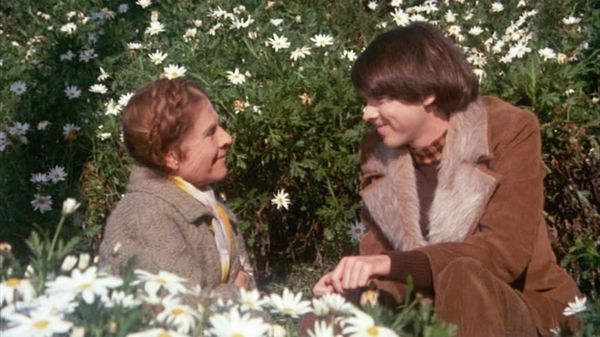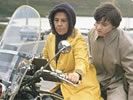Eye For Film >> Movies >> Harold And Maude (1971) Film Review
Harold And Maude
Reviewed by: James Benefield

Cinematically, Harold And Maude is a child of the Seventies. A film about death and disillusionment jarringly complete with a sunny Cat Stevens soundtrack, on the surface it is about pushing boundaries and definitions (not least in the kind humour allowed to be depicted on screen). However, it’s also a film about being true to yourself and following your own path.
Harold (Bud Cort) is unusually preoccupied with death. He’s coming of age in a world of wealth and privilege, and not interested in any of it. He’d rather attend the funerals of strangers and fake his own suicide in increasingly theatrical ways. At one funeral, he meets Maude (Ruth Gordon). She also regularly attends funerals of strangers. She also steals cars, liberates canaries from pet shops and is easily old enough to be his grandmother. Naturally, the two become close.

The movie is directed by free spirit Hal Ashby. You can sense his off-kilter, detached but wise and gentle voice throughout the movie. There is a facetious tone, but it’s loveably cheeky; in one scene Harold appears to set himself alight to avoid a date (set up by his mother) with a sorority girl. The girl runs out the room screaming, nearly knocking over an unscathed Harold making a surprise entrance. His mother is disgusted; Harold looks sardonically into the camera, to the sound of another Cat Stevens song.
However, it’s not this tone, but rather Harold’s developing connection with Maude that proves to be the real backbone of the movie. Maude’s uniqueness, whether she's defying a parade of authority figures, or regaling Harold with stories about her renegade past, intrigues and disgusts Harold in equal measure. Most importantly, it gives him something to live for. His previous pleasures mostly derived from annoying his mother and staging his macabre faux-suicide spectacles.
Wisely, Ashby keeps the portrayal of the relationship’s details coy. There is implication in these 90 minutes, but it’s buried within, and between, the twosome’s antics. However, one of the challenges (and rewards) of the movie is not deciphering what exactly happens between the two. It’s not important. It’s watching, and emotionally investing in, the bonding of these two lost souls. It’s something that they want to do; it’s their secret and their world.
The most important message the film has is follow your heart, no matter how weird other people think you are for doing so. Although the way the film says this may not be to everybody’s taste (the potent cocktail of black comedy and anti-authoritarian, and sometimes anti-war, sentiments may strike some as less irreverent than tasteless; the nature of the central relationship may also put some people off), there is no doubting the singularity of Ashby’s movie. Although he would go on to make his calling card (the sublime Being There), he would never make a film so unusual, and destined for cult status. And that is why it’s so easy to fall in love with Harold and Maude.
Reviewed on: 10 Jan 2010

















